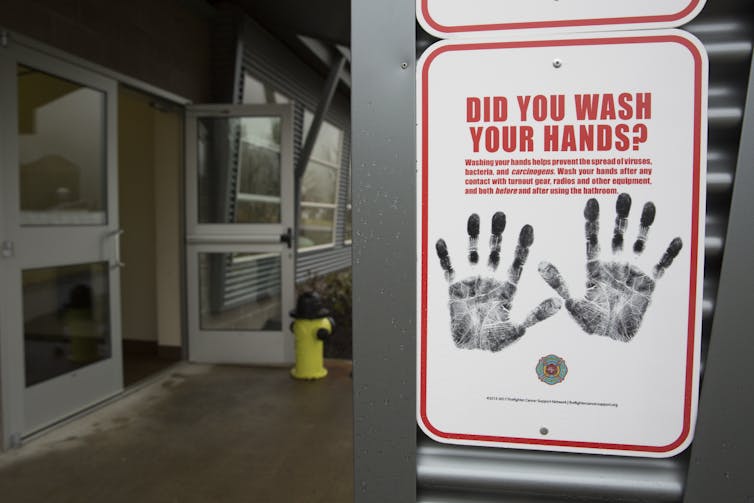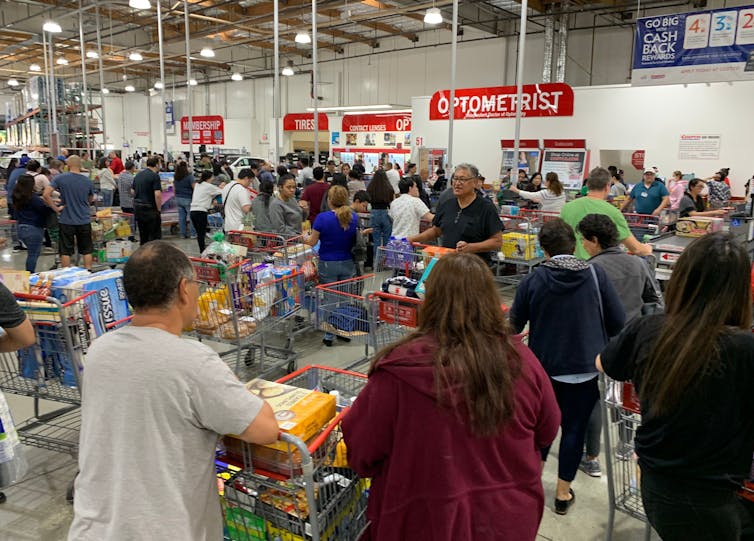How to maintain physical and mental health during coronavirus
- Written by Nita Bharti, Assistant Professor of Biology, Center for Infectious Disease Dynamics, Pennsylvania State University
Millions are asking for clear, comprehensive information and guidelines regarding the novel coronavirus. Unfortunately, the U.S. public hasn’t received factual information or future direction from the federal government. Instead, the government has underreported[1] cases and local transmission rates due to a lack of testing kits.
But during a crisis, leadership can come from unexpected places.
As he suspended all NBA games, commissioner Adam Silver delivered a powerful message[2] to the public that the outbreak must be taken seriously. With that single announcement, Silver enforced more effective public health policy than the White House has during this pandemic. Shortly thereafter, all other major sports leagues followed his lead; the NBA’s decisive action helped the dominoes fall.
Last January, NFL running back Marshawn Lynch delivered solid advice for his younger colleagues in a post-game interview[3]: take care of your bodies, your mentals, and your chicken (that is, your money). Fortuitously, this is also applicable for everyone during COVID-19.
As an assistant professor of biology[4] at The Pennsylvania State University, I study infectious disease risks and preventative solutions. I know the only way to stop this outbreak and prevent severe cases is to reduce transmission. Without all of us changing our behavior, those who are more likely to experience severe outcomes will have negative health outcomes.
While the elderly and people with respiratory conditions are at highest risk, severe cases have also been reported in young, otherwise healthy people. Without behavioral interventions, so many patients will require hospitalization, they will exceed the capacity of the U.S. health care system. This will cause preventable deaths.
Reducing overall transmission will protect the most vulnerable members of our communities and keep the health care system functioning. You are no longer making decisions for only yourself, you have to constantly consider how your personal behavior is going to impact everyone around you and everyone around them.
 Outside a dormitory at the Washington State Patrol Fire Training Academy, a sign reminds people to wash their hands.
Getty Images / Jason Redmond[5]
Outside a dormitory at the Washington State Patrol Fire Training Academy, a sign reminds people to wash their hands.
Getty Images / Jason Redmond[5]
You need space, but you also need connection
So far, no pharmaceutical interventions, such as vaccines and antiviral drugs, exist. At the moment, we must rely on basic public health measures: wash your hands frequently, don’t touch your face, use hand sanitizer, and limit your exposure to others. It may sound simplistic, but those things are enormously helpful. Non-pharmaceutical interventions are extremely effective against infectious diseases; all Ebola epidemics prior to 2014 are just one example.
Right now, this means avoiding direct physical contact with others. Avoid crowds, currently groups over 10[6], reduce or eliminate non-essential travel, and expand the space between you and others to practice social distancing. Give yourself about 6 feet of space. But if you’re feeling sick, you don’t have to become sedentary or trapped indoors. Go for a walk, dance around[7] your house, or tune into on-demand fitness or YouTube instructors. If you think you’re getting sick (or if you’re already sick) you need to stay home[8] and keep away from others. Self-quarantine is a good idea anytime you think you have an infectious disease.
Social distancing is actually physical distancing; it does not mean social isolation. During this outbreak, your mental health[9] is critical and vulnerable right now. Social support helps[10] and is also linked to physical health[11]. It’s all[12] connected[13].
Make deliberate efforts to be in touch with family, friends, or colleagues/classmates who are now telecommuting. Any kind of direct communication will be supportive: email, texts, video chats, even voice calls, if that’s your thing. It’s likely someone you know will end up in quarantine or isolation for 14 days,[14] and it will be psychologically challenging[15]. Help them, but don’t take on all the responsibility.
Create a schedule to have a different friend or relative check in with them. Also note that social media can have negative impacts[16] on mental health. Don’t assume[17] Instagram puppies will keep your quarantined friends fully supported.
Missing travel or events you’ve been excited about will bring disappointment. It’s OK to feel sad about losses that seem trivial right now. The endless stream of news, with rapidly changing information and misinformation, can be overwhelming. The lack of a large-scale management plan from the government might leave you frustrated. Take a moment to acknowledge those feelings of insecurity. Now more than ever, don’t face your anxiety alone.
 Shoppers in Los Angeles stock up on essentials: food, water and toilet paper.
Getty Images / Mark Ralston / AFP[18]
Shoppers in Los Angeles stock up on essentials: food, water and toilet paper.
Getty Images / Mark Ralston / AFP[18]
We’re in this together
Finally, the meaty part of all this: Don’t blow your paycheck stockpiling months of food and supplies. Don’t panic and buy every possible over-the-counter drug. Buy what you need and leave the rest for others.
It is a good idea to check your prescription medications and make sure you’ve got a month’s supply on hand. Assess the shelf-stable foods you have. You may own enough unexpired cans and products to get you through several days. Aim to have two to four weeks of non-perishables around so you don’t have to shop frequently and base your decisions on what you can safely spend and store.
Since this outbreak began, the federal government has fumbled response and preparedness. Conversely, local government officials set precedents to eliminate costs for testing and treatment. New York[19], Washington and California[20] led the way, announcing free testing early.
On March 12, Rep. Katie Porter pressed the director of the Centers for Disease Control and Prevention to finally deliver a long-overdue “guarantee” of free coronavirus testing for every American. We don’t know how this will roll out operationally, given the shortage of test kits, but the importance of free testing cannot be overstated[21]. People don’t get tested if they’re worried about costs. And that’s a huge problem: Unreported or mild cases lead to transmission that is nearly impossible to stop.
Employers[22] also need to encourage and reward responsible self-quarantining behavior. Paid sick leave[23] would vastly improve compliance with self-quarantine measures. A system where sick days translate to lost wages promotes virus transmission.
This outbreak will continue to change our lives. We will not go back to the way things were in two weeks. We are looking ahead to a new normal. To protect the most vulnerable members of our communities, the less vulnerable must make responsible and unselfish choices. The necessary interventions to manage this outbreak have been unprecedented and sometimes unpopular[24] but necessary. Marshawn Lynch wisely instructed us to protect our bodies, our mentals, and our chicken. Now it’s our responsibility to extend that to protecting each other.
[Insight, in your inbox each day. You can get it with The Conversation’s email newsletter[25].]
References
- ^ underreported (www.theatlantic.com)
- ^ delivered a powerful message (www.cbssports.com)
- ^ post-game interview (www.nbcsports.com)
- ^ assistant professor of biology (bio.psu.edu)
- ^ Getty Images / Jason Redmond (www.gettyimages.com)
- ^ currently groups over 10 (www.nytimes.com)
- ^ dance around (open.spotify.com)
- ^ stay home (www.nytimes.com)
- ^ your mental health (www.who.int)
- ^ Social support helps (www.ncbi.nlm.nih.gov)
- ^ is also linked to physical health (www-jstor-org.ezaccess.libraries.psu.edu)
- ^ It’s all (www.thelancet.com)
- ^ connected (www.ncbi.nlm.nih.gov)
- ^ 14 days, (www.thelancet.com)
- ^ challenging (www.nytimes.com)
- ^ negative impacts (www-clinicalkey-com.ezaccess.libraries.psu.edu)
- ^ Don’t assume (journals-sagepub-com.ezaccess.libraries.psu.edu)
- ^ Getty Images / Mark Ralston / AFP (www.gettyimages.com)
- ^ New York (twitter.com)
- ^ Washington and California (www.wsj.com)
- ^ free testing cannot be overstated (time.com)
- ^ Employers (www.businessinsider.com)
- ^ Paid sick leave (time.com)
- ^ unprecedented and sometimes unpopular (www.si.com)
- ^ You can get it with The Conversation’s email newsletter (theconversation.com)
Authors: Nita Bharti, Assistant Professor of Biology, Center for Infectious Disease Dynamics, Pennsylvania State University
Read more https://theconversation.com/how-to-maintain-physical-and-mental-health-during-coronavirus-133602

